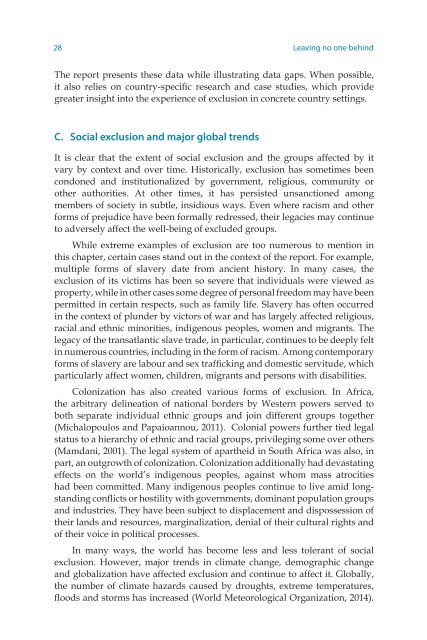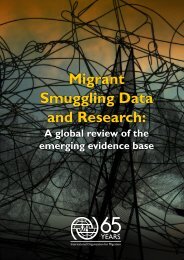Leaving no one behind the imperative of inclusive development
full-report
full-report
Create successful ePaper yourself
Turn your PDF publications into a flip-book with our unique Google optimized e-Paper software.
28<br />
<strong>Leaving</strong> <strong>no</strong> <strong>one</strong> <strong>behind</strong><br />
The report presents <strong>the</strong>se data while illustrating data gaps. When possible,<br />
it also relies on country-specific research and case studies, which provide<br />
greater insight into <strong>the</strong> experience <strong>of</strong> exclusion in concrete country settings.<br />
C. Social exclusion and major global trends<br />
It is clear that <strong>the</strong> extent <strong>of</strong> social exclusion and <strong>the</strong> groups affected by it<br />
vary by context and over time. Historically, exclusion has sometimes been<br />
cond<strong>one</strong>d and institutionalized by government, religious, community or<br />
o<strong>the</strong>r authorities. At o<strong>the</strong>r times, it has persisted unsancti<strong>one</strong>d among<br />
members <strong>of</strong> society in subtle, insidious ways. Even where racism and o<strong>the</strong>r<br />
forms <strong>of</strong> prejudice have been formally redressed, <strong>the</strong>ir legacies may continue<br />
to adversely affect <strong>the</strong> well-being <strong>of</strong> excluded groups.<br />
While extreme examples <strong>of</strong> exclusion are too numerous to mention in<br />
this chapter, certain cases stand out in <strong>the</strong> context <strong>of</strong> <strong>the</strong> report. For example,<br />
multiple forms <strong>of</strong> slavery date from ancient history. In many cases, <strong>the</strong><br />
exclusion <strong>of</strong> its victims has been so severe that individuals were viewed as<br />
property, while in o<strong>the</strong>r cases some degree <strong>of</strong> personal freedom may have been<br />
permitted in certain respects, such as family life. Slavery has <strong>of</strong>ten occurred<br />
in <strong>the</strong> context <strong>of</strong> plunder by victors <strong>of</strong> war and has largely affected religious,<br />
racial and ethnic mi<strong>no</strong>rities, indige<strong>no</strong>us peoples, women and migrants. The<br />
legacy <strong>of</strong> <strong>the</strong> transatlantic slave trade, in particular, continues to be deeply felt<br />
in numerous countries, including in <strong>the</strong> form <strong>of</strong> racism. Among contemporary<br />
forms <strong>of</strong> slavery are labour and sex trafficking and domestic servitude, which<br />
particularly affect women, children, migrants and persons with disabilities.<br />
Colonization has also created various forms <strong>of</strong> exclusion. In Africa,<br />
<strong>the</strong> arbitrary delineation <strong>of</strong> national borders by Western powers served to<br />
both separate individual ethnic groups and join different groups toge<strong>the</strong>r<br />
(Michalopoulos and Papaioan<strong>no</strong>u, 2011). Colonial powers fur<strong>the</strong>r tied legal<br />
status to a hierarchy <strong>of</strong> ethnic and racial groups, privileging some over o<strong>the</strong>rs<br />
(Mamdani, 2001). The legal system <strong>of</strong> apar<strong>the</strong>id in South Africa was also, in<br />
part, an outgrowth <strong>of</strong> colonization. Colonization additionally had devastating<br />
effects on <strong>the</strong> world’s indige<strong>no</strong>us peoples, against whom mass atrocities<br />
had been committed. Many indige<strong>no</strong>us peoples continue to live amid longstanding<br />
conflicts or hostility with governments, dominant population groups<br />
and industries. They have been subject to displacement and dispossession <strong>of</strong><br />
<strong>the</strong>ir lands and resources, marginalization, denial <strong>of</strong> <strong>the</strong>ir cultural rights and<br />
<strong>of</strong> <strong>the</strong>ir voice in political processes.<br />
In many ways, <strong>the</strong> world has become less and less tolerant <strong>of</strong> social<br />
exclusion. However, major trends in climate change, demographic change<br />
and globalization have affected exclusion and continue to affect it. Globally,<br />
<strong>the</strong> number <strong>of</strong> climate hazards caused by droughts, extreme temperatures,<br />
floods and storms has increased (World Meteorological Organization, 2014).
















